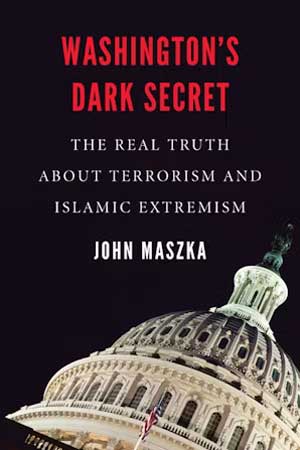Maszka claims that the book was peer-reviewed by around twelve or so academics. However, many of the talking points Maszka tosses out don’t do much other than throw this assertion into doubt. Maszka also insists, early into the book, that he was almost denied entry from his Master’s program at Northern Illinois University into his Doctoral program over political differences; however, if this book is any indication, he was almost denied entry not due to differences in political opinion, but because he is simply not all that talented as a researcher or as a scholar. While Washington’s Dark Secret – per its sensationalist title – veers into polemic, many of the more loaded arguments found therein don’t exactly have legs to stand on.


There are elements of the book that are objectively accurate, and that, sans the more opinionated portions, can be found in other primers or refreshers on terrorism studies. Maszka notes, for example the statistical improbability of a terrorist attack. Maszka also provides an accurate historical deep dive into the history of Islamic extremism. Maszka addresses such topics as Hasan Al-Banna’s founding of the Muslim brotherhood, Sayyid Qutb’s writing of such works as Social Justice in Islam and Signposts on the Road (referred to herein as Milestones on the Path), and the life story of Ayman al-Zawahiri. All are individuals who, in one way or another, influenced Al-Qaeda leader and 9/11 mastermind Osama Bin Laden. Maszka also expertly categorizes different views of the use of violence by Islamic extremists, citing takfiri doctrine (which suggests that a Muslim can use violence against other Muslims who’ve committed apostasy) as fundamentally the most dangerous. Maszka also rightly calls out Daniel Pipes and other western pundits posing as policy wonks whose work has revolved around demonizing Islam as a religion.
One problem with Maszka’s approach, however, is that he notably refuses to call some acts of terrorism what they are – terrorism. Maszka refuses, for example, to consider the Pulse nightclub shooting that took place in Orlando, Florida in 2016 an act of terrorism. This despite the fact that a targeted attack against a marginalized community (in this case, LGBTQ+) often left on the defensive to fight for their political rights can be considered politically motivated – and thus, meet the definitional category of terrorism (notably, the perpetrator, Omar Mateen, cited anger over the United States’ killing of Islamic State leader Abu Waheeb as a motivation, although Maszka denies Islamic extremism was a factor). Likewise Maszka, puzzlingly, does not consider Eco-Fascist Anders Breivik a terrorist, despite – again – an explicitly political motivation for his violent actions. The latter case seems to be one that Maszka does not consider worth addressing as terrorism simply because Islamic extremism was not involved.
If Maszka’s goal is to help the reader disentangle the notion of associating Islam as a religion with terrorism, then why exactly does he refrain from referring to acts of politically motivated violence by non-state actors terrorism when they are committed without a Muslim religious motivation? This is particularly jarring given that the book was written and published at a time when far-right acts of terrorism such as the 2017 vehicular murder of left-wing activist Heather Heyer by far-right extremist James Alex Fields in Charlottesville, Virginia made global headlines. By focusing his discussion of terrorism almost exclusively on Islam, Maszka therefore feeds into the very problem he claims he wrote the book to counter.
This is not to say that Maszka is without a deep empathy when it comes to his own experience traveling and living in the Islamic world, including countries as diverse and different from one another as Kyrgyzstan and the United Arab Emirates. Maszka provides plenty of intriguing anecdotes about the people he has met and their concerns, however unlikely, about being the targets of hostile action by the United States and its allies should they be in the wrong place at the wrong time. However, Maszka’s understanding of the United States itself is lacking, to say the very least. In an aside about how yesterday’s terrorist is tomorrow’s freedom fighter, Maszka name drops such examples as Nelson Mandela, Yasser Arafat, and for some reason… former United States President Barack Obama. Whom, incidentally, no credible authority has ever considered a terrorist. In his introduction, Maszka also alludes to Donald J. Trump (the President of the United States at the time of the book’s writing and publication) as a radical conservative reformer who risks assassination from the Deep State if he shakes things up too much. Frankly, the reader is certainly left to wonder how such a paranoid, harebrained take ended up in a book published by an imprint of an academic press (Potomac Books, an imprint of the University of Nebraska Press).
Maszka’s comprehension of history, outside of a deep knowledge of Islamic reform movements, is also quite faulty and includes some ridiculously baffling takes. Maszka, for example, suggests that both world wars were about oil. In establishing this malformed historical analysis, Maszka lays the foundation for recycling the discredited “Blood for Oil” myth about U.S. involvement in Afghanistan and Iraq post-9/11. In his understanding of economic statecraft, Maszka persistently confuses cause and effect, failing to understand that material resources are an instrument of state influence and competition – not an end in themselves.
Maszka has established a noble goal in calling out the scapegoating of Muslims – and Islam – as sources of terrorism. However, Maszka narrows down his own definition of terrorism to focus only on Islamic extremism. In making this choice, Maszka reinforces the very problem he claims he is attempting to push back against. Further, his polemical assertion that “Western” (particularly U.S.) campaigns against terrorism can be reduced to greed for oil rests on unstable foundations, and this loaded argument suffers greatly from Maszka’s own pathetically poor grasp of historical and economic patterns.
